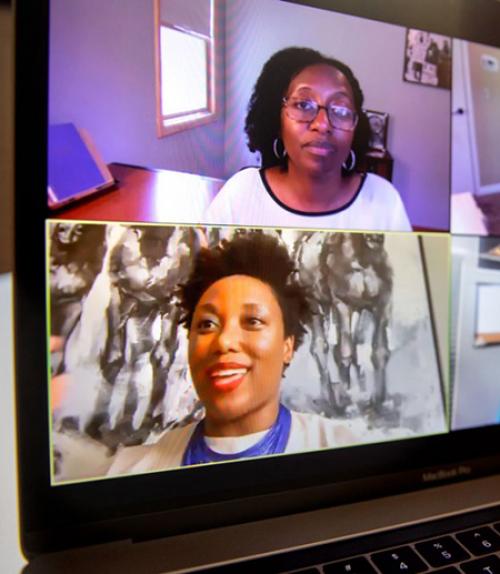While the coronavirus pandemic is frequently described as unprecedented, its disproportionate toll on communities of color has come as no surprise to scholars who have lived and studied health inequities in the United States.
“For those of us living in black and brown bodies … it’s not unprecedented, it’s business as usual, unfortunately,” said Rachel Hardeman, associate professor at the University of Minnesota School of Public Health. “Like other epidemics, structural or systemic racism is causing widespread suffering, not only for Black people and other communities of color, but I would argue for our society as a whole.”
Hardeman was one of three panelists who shared expertise in a webinar, “Systemic Racism and Health Equity,” hosted July 23 by the Cornell Center for Health Equity. Live tweets about the event were posted with the hashtag “#healthequity2020”; a recording will be posted on the center’s website.
Hardeman was joined by Courtney Cogburn, associate professor at the Columbia University School of Social Work, and Whitney Pirtle, assistant professor of sociology at the University of California, Merced.
Jamila Michener, associate professor of government in the College of Arts and Science, moderated the conversation. Michener and Jeff Niederdeppe, professor of communication in the College of Agriculture and Life Sciences, recently were named co-directors of the health equity center, along with Dr. Monika Safford, the John J. Kuiper Professor of Medicine at Weill Cornell Medicine in New York City.
“As COVID-19 is, even as we speak, ravaging Black, brown and native communities, this is a discussion that is as important as ever,” Michener said. “What COVID-19 has done is it’s revealed processes and patterns that are already there. But by revealing them more blatantly, it has also, I think, challenged us to confront and address them more directly.”
Systemic racism and resulting health disparities date to the nation’s inception, Pirtle said. Across housing, schools, jobs, transportation, criminal justice – and certainly health care – racism has shaped systems that underserve people of color, she said. During the pandemic, she said, Black Americans have been more likely to be turned away from hospitals with symptoms, have faced longer waits to get tested and suffered higher death rates.
“It’s shameful that so many people have died to remind us how unequal our society is,” Pirtle said. “COVID-19 is just giving us more undeniable evidence that racism is killing.”
Cogburn said the higher rates of infection, hospitalization and mortality from COVID-19 among Blacks, Latinos and Native Americans in the U.S. apply to many other diseases, including cancer, stroke, heart disease and diabetes.
“The pandemic is just showing us who we are and who we have been,” she said. “The silver lining of this moment is that it has made the social inequalities in our country so starkly visible in ways that are very difficult to deny.”
Moving forward, Cogburn said, decisions about everything from public health policy and legislation to research grants to the hiring of faculty and clinicians must start with an acknowledgement and understanding of systemic racism.
“We’re talking about a complete orientation and worldview shift,” she said. “It’s not considering the possibility of racism; it’s acknowledging as a default that racism is there and then acting accordingly.”
There’s no simple five-step plan that can solve the problem, Michener said. The panelists encouraged self-reflection about privilege, training and embedding anti-racism approaches in organizations, in addition to voting, activism and engagement with local zoning and school boards. High-priority policy areas, they suggested, included segregation in residential housing, housing instability and universal health care.
“There’s so many different ways to be plugged in,” Pirtle said. “I just want to encourage people not to sit back and think that they can’t have an active role right now, because it’s like an all-hands-in moment.”
Michener concluded the discussion by asking what keeps the panelists hopeful while working against huge structural inequities that sometimes seem insurmountable. They cited that day’s webinar and conversations like it, as well as inspiring work by colleagues and activism by young people demanding change.
“I have seen so many young people and so many students speak up in ways that have been incredibly powerful,” Hardeman said. “It leaves me really hopeful right now.”
Michener said the volume and urgency of questions submitted to the panel “suggests that there is real possibility, real potential out there.” And she referred back to an idea Hardeman had raised: that while Black people in particular deserve equity, “more than that, we deserve love.”
The fundamental need to overcome systemic racism and achieve health equity, Michener said, is about giving people access “to lives that are full and that are fair, because they’re people who have an inherent dignity.”




